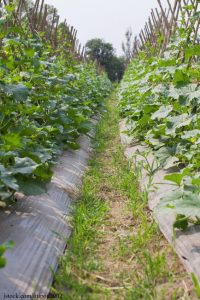Cucumbers distributed by Andrew & Williamson Fresh Produce of California, and grown in Baja Mexico, are being recalled in connection with a large Salmonella outbreak in 27 states. But Salmonella bacteria do not occur naturally on cucumbers; that bacteria is usually found on chickens, beef, and pork. Where did it come from?
 The Centers for Disease Control and Prevention (CDC) had a meeting with independent industry experts about this outbreak last month. An industry meeting was held on August 26, 2015, with four independent experts from the produce industry. They discussed crop production and distribution practices that may have caused the contamination. These recalled cucumbers were grown on poles in a field.
The Centers for Disease Control and Prevention (CDC) had a meeting with independent industry experts about this outbreak last month. An industry meeting was held on August 26, 2015, with four independent experts from the produce industry. They discussed crop production and distribution practices that may have caused the contamination. These recalled cucumbers were grown on poles in a field.
Most consumers aren’t aware that fresh produce is one of the leading vehicles for pathogenic bacteria. In fact, the pathogen-commodity pair of Salmonella and vine-stalk vegetables (tomatoes, cucumbers) is the third most common combination responsible for outbreaks, according to CDC data.
So how does bacteria get onto cucumbers in the first place? There are several ways this happens.
First, feces in the field can contaminate produce. Wild animals in the field can defecate on plants and deposit bacteria. In the ongoing Cyclospora outbreak linked to cilantro grown in Mexico, investigators found human feces and toilet paper in the fields. People can be carriers of Salmonella bacteria without showing any symptoms.
Second, irrigation water can be contaminated with bacteria. Large feedlots, or concentrated animal feeding operations (CAFOs) create tons of manure full of pathogenic bacteria that can get into the ground water. When that water is used to irrigate farm fields, it can contaminate fruits and vegetables.
Third, unsanitary conditions in the packing sheds and distribution channels can contaminate produce. If trucks, containers, washing equipment, conveyer belts, or buildings are not sanitary and regularly cleaned with disinfectant, the produce can be contaminated. Many of these buildings used to clean and pack produce can be open to birds and wildlife, which can also contaminate the product.
These are all reasons why it is critically important that consumers, retailers, and restaurants handle produce so it is safe to eat. All produce should be thoroughly washed with clean running water before it is prepared or eaten. Produce with crinkled or rough surfaces, such as cantaloupes and spinach, can be difficult to clean thoroughly. Cooking will kill pathogenic bacteria, but most fresh produce is eaten raw, without a kill step.
If you ate raw cucumbers, either from the grocery store or from a meal at a restaurant, and have experienced the symptoms of Salmonella food poisoning, please see your doctor. These symptoms include diarrhea, which may be bloody, fever, nausea, abdominal cramps, and vomiting. Symptoms usually begin 6 to 72 hours after exposure to the bacteria, and last about a week. But even if you recover completely from this illness without medical attention, you could suffer complications in the future, including reactive arthritis. Your doctor should know about your illness.
The hospitalization rate in the ongoing Salmonella outbreak linked to imported Andrew & Williamson cucumbers is 33%, much higher than the usual hospitalization rate of 20%. Many of those sickened in this outbreak are children, who are more susceptible to complications from this illness. Or the Salmonella Poona bacteria that has sickened patients may be resistant to antibiotics; we don’t know yet.
The cucumbers recalled in connection with this outbreak were sold in Alaska, Arizona, Arkansas, California, Colorado, Florida, Idaho, Illinois, Kansas, Kentucky, Louisiana, Minnesota, Mississippi, Montana, Nevada, New Jersey, New Mexico, Oklahoma, Oregon, South Carolina, Texas, and Utah. They may have been distributed to other states as well.




